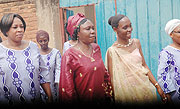War deprived Jackline Murungi, 30, of motherly love at the age of 8 months. Living within the care of another family she grew up ignorant of the facts of her torn family.But along the way, death started unveiling the hidden facts of her torn parentage.


War deprived Jackline Murungi, 30, of motherly love at the age of 8 months. Living within the care of another family she grew up ignorant of the facts of her torn family.
But along the way, death started unveiling the hidden facts of her torn parentage.
Her father’s death came during primary level. The latter was strange to her because she had never been told about her actual family.
Developing an inquisitive mind, Murungi began to question the whereabouts of her mother.
"When they asked my grandmother on mother’s side, she said that my mother had died,” Murungi recalls.
The family warmth that she was previously enjoying grew colder with the knowledge that she didn’t actually belong and that she had been protected from the truth of her past.
It was in 1979,Hadija Ssebi, Murungi’s mother , a Ugandan and soldier in Idi Amin’s regime sought refugee in Sudan after the then government was being toppled.
"Before I fled to Sudan I left the baby in the care of its father,” she said.
Murungi’s father, a Rwandese was unable to take care of the baby and took her to his mother.
Later, on her death bed she called one of her daughters and presented Murungi to her.
She stressed that she take care of the child as her own.
It is then that Murungi started living with her Auntie who endeavored to follow what her mother had stressed and even hid the truth about her real parents.
But the hidden family was brought to light when her biological father died.
Murungi’s eyes opened to the biological connection between her father and the auntie that had raised her and started asking questions.
Immediately after the 1994 genocide against the Tutsi, she moved to Rwanda with her family and started secondary school but vowed to keep looking for her mother.
"I went to school with Murungi in secondary in 1995. In 2008 she told me that she was going to Uganda to look for her mother,” recounted Phinah Kaytinga a close friend.
It was on the parent search on her return to Uganda that Murungi saw an announcement of a woman requesting to know her whereabouts.
"I read in one of the newspapers but didn’t believe because I thought that she had died. I had been told that she had died,” she said.
Though taking another step to go and meet the woman, she was suspicious.
"I thought they were those people who fool around and extort money,” she said.
"When we met I told her that she had a birth mark on her buttocks to prove that she was my daughter,” said Ssebi.
But this was not convincing enough for Murungi who still carried the preconceived idea of her real mother having died.
Still passionate about finding the mother Murungi pondered on the best way to prove their relationship. She then chose a DNA test.
And without the mother’s knowledge she stealthily took a piece of her nail.
"I sent the nail for DNA testing to South Africa,” she revealed.
Science later displaced her disbelief with a party to embrace Ssebi as her biological mother after 30 years.
Murungi, since 2007 is the President of Nyamirambo women’s center a local NGO that aims at empowering women.
She threw a party that convened neighbours, friends and family at her residence in Nyamirambo a suburb of Kigali city.
Ends


